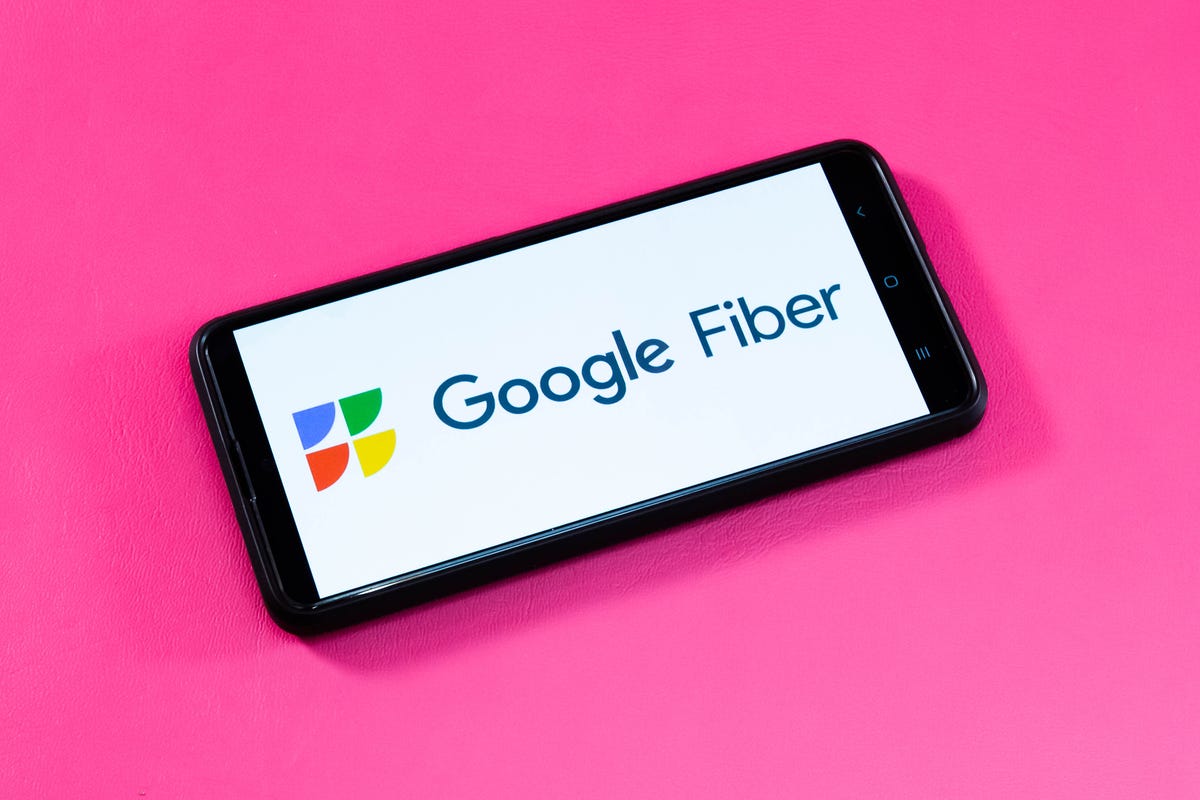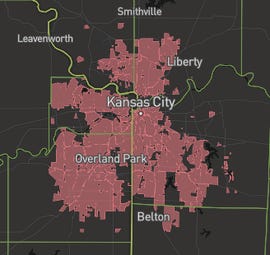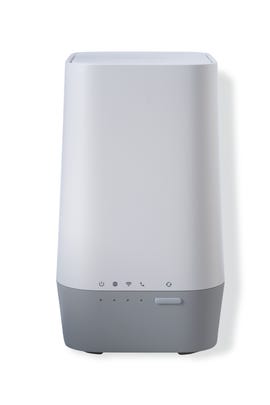
Like
- Fast speeds, low cost per Mbps
- Equipment included, unlimited data, no contracts
- 2-gig service comes with Wi-Fi 6 router
- Active fiber expansion
Don’t Like
- Somewhat limited plan options
- Lowest starting price is $70 per month
- Lots of room to grow
Product details
-
Price range
$70 – $100 per month -
Speed range
1,000 – 2,000Mbps -
Connection
Fiber -
Highlights
Unlimited data, no contracts, equipment included
In this article:
Living in a suburb of a Google Fiber city (Charlotte, North Carolina), service is unfortunately just out of reach. Recently resumed expansion in my area could eventually bring the ISP to my address, and I’ll consider signing up if it does. The value is too good to pass up.
When I say “value,” I’m not necessarily talking about cheap internet. Google Fiber has one of the highest starting prices of any top ISP. However, you get what you pay for, as speeds start at 1,000 megabits per second, aka gigabit service. Add in customer-friendly perks like unlimited data and no contract requirements — as well as free equipment rental, a more uncommon one — and the premium cost becomes more justified, the value more apparent.

Sarah Tew/CNET
As one who appreciates high-speed internet and is willing to pay a little more for it, I’d say Google Fiber is worth checking out. Few fiber providers match Google Fiber’s speed potential, let alone service from cable or DSL providers. You’ll want to consider more than speed when shopping for internet service in your area, though, so here’s a full rundown of what you can expect from Google Fiber.
Google Fiber coverage

FCC/Mapbox
Google Fiber’s availability is nowhere near rival fiber providers like AT&T, Verizon Fios or CenturyLink, but it offers service in some reasonably large metro areas. Kansas City and Huntsville, Alabama have the most significant Google Fiber coverage, but service can also be found in parts of Orange County, California; Atlanta, Georgia; Charlotte and the Raleigh/Durham area of North Carolina; Nashville, Tennessee; Austin and San Antonio, Texas; Salt Lake City and Provo, Utah; and now also West Des Moines, Iowa.
Google Fiber expansion continues
The list of cities that have access to Google Fiber is growing, as is the availability in markets where Google Fiber is currently.
Admittedly, Google Fiber is still available to less than 1% of US residents, according to the most recent FCC data. That said, there are positive signs of growth and the rapid expansion continues in existing markets and new ones like Lakewood, Colorado.
Furthermore (and encouraging to a suburbanite like myself), Google Fiber shows signs of expansion outside major city limits. For example, Google Fiber is set to expand into Concord and Matthews, North Carolina, two Charlotte suburbs I would not have expected to see such a premium service. I’m still waiting for Google Fiber to reach me a little further south of Charlotte, but if it’s available in your area or where you’re moving to, here’s what you can expect as far as plans and service details are concerned.
Google Fiber plans and service details
Google Fiber has two, maybe three plan options: 1Gbps or 2Gbps and a new 5Gbps plan that’s currently available only in select areas. While gig service is typical of fiber providers and most cable providers, AT&T, Frontier, Xfinity and Ziply Fiber are the only other primary providers to offer multi-gigabit plans.
Select cities — specifically Chicago, Denver, Miami, San Diego, San Francisco, Seattle and Oakland, California — have access to Google Webpass, a high-speed fixed wireless internet service similar to Starry Internet. There’s only one plan available with Google Webpass, gigabit service, but cheaper pricing may be available if your building’s network can’t support gigabit speeds.
Google Fiber plans
| Plan | Monthly price | Max speeds | Equipment cost | Data cap | Contract |
|---|---|---|---|---|---|
| 1 Gig | $70 | 1,000Mbps download, 1,000Mbps upload | None | None | None |
| 2 Gig | $100 | 2,000Mbps download, 1,000 Mbps upload | None | None | None |
| 5 Gig | $125 | 5,000Mbps download, 5,000Mbps upload | None | None | None |
| Google Webpass | $70, or $63 with a yearly plan | 1,000Mbps download, 1,000Mbps upload | None | None | None |
More and cheaper plan options would be nice (Google Fiber previously offered a 100Mbps plan for $50 per month), but I have to admit I like that gig service is the baseline. As streaming in HD and 4K become the norm and we’re connecting everything from smartphones and tablets to speakers, thermostats and a plethora of other devices to the internet, plans with speeds around and below 100Mbps are becoming less practical, even if they are easier on the budget.
Getting back to value, Google Fiber plans are actually better priced than most, even though no “cheap” option is available. At $70 per month, Google Fiber’s gig service is priced lower than fiber providers AT&T, Frontier and Verizon Fios and cable ISPs including Cox, Spectrum and Xfinity. Then there’s the $100 per month 2 Gigs plan, which is still cheaper than what some providers charge for a single gig service.
A good indicator of value is the cost per Mbps, which you can find for any internet plan by dividing the monthly fee by the max speeds. Google Fiber’s 1 Gig plan starts at $70 per month for speeds up to 1,000Mbps, which comes to an estimated cost per Mbps of 7 cents. The 2 Gigs plan is even lower at 5 cents per Mbps. A sub-dime cost per Mbps is often a great internet deal, and the cost per Mbps of both Google Fiber plans is on par with or lower than most providers at any speed tier.
Google Fiber’s 5 Gig plan, though not yet widely available, actually boasts the lowest cost per Mbps (less than 3 cents), of any major provider or plan. It’s still a bit pricey at $125 per month, but the speeds you get more than justify the cost.
Straightforward pricing with no added fees
Google Fiber doesn’t have introductory pricing, so you don’t have to worry about a looming price increase after 12 months. That’s not to say the price will never go up, but there’s no guarantee that it will after a certain number of months.
Additionally, Google Fiber plans come with unlimited data (so no overage fees) and no contracts with a required service length (so no early termination fees). Unlimited data and no contracts are becoming more common among ISPs. Still, some big-name providers will require you to sign an agreement to get the lowest pricing or tack on $50 or more in overage fees for exceeding your data limit.
No equipment costs, even for mesh Wi-Fi and Wi-Fi 6 routers

Google Fiber
Google Fiber’s 1 Gig plan comes with a Wi-Fi router and up to two access points, which extend the range and coverage of Wi-Fi service throughout your home, up to around 3,000 square feet. You can purchase more access points for $100 each if you need additional coverage. You also can use your own router, but seeing as how Google Fiber includes one at no extra cost, I can’t imagine why you’d want to unless you need a top-of-the-line router for serious gaming or other specialized uses.
The 2 Gig plan comes with a Multi-Gig Wi-Fi 6 router, the latest available Wi-Fi technology and estimated to be roughly 30% faster than the previous Wi-Fi iteration. The technology is exciting, but Wi-Fi routers can be a bit pricey, so it’s nice that Google Fiber includes one at no extra cost. Like with the 1 Gig plan, Wi-Fi extenders are included if needed to ensure whole-home Wi-Fi coverage. There is no option to use your own equipment with the 2 Gig plan, but the device should be more than suitable for any standard home internet use.
How does Google Fiber stack up against competitors?
If Google Fiber is available in your area, it’s safe to assume you also have a cable provider and possibly even another fiber provider available at your address. In that case, you’ll want to know how Google Fiber compares.
Compared to other fiber providers — or really any ISPs — Google Fiber will have a higher starting price. You’ll find lower monthly starting prices from AT&T Fiber ($55), CenturyLink ($50), Frontier Fiber ($45) and Verizon Fios ($40) but again, it is worth noting that these cheaper plans come with significantly lower speeds. If those speeds, typically around 200 to 300Mbps, are sufficient for your household, a more affordable plan like what’s available from AT&T or Verizon Fios may be your best bet.
There’s arguably no better gig or 2-gig provider
If you’re interested in gig service, Google Fiber will be tough to beat, even among competing fiber providers. At $70 per month, the starting pricing for Google Fiber’s gig service is lower than AT&T, Frontier and Verizon ($80 to $90 per month). Lumen’s Quantum Fiber internet, formerly known as CenturyLink Fiber, is a touch cheaper at $65 per month, but the provider currently doesn’t offer a 2-gig plan or the same quality when it comes to Wi-Fi equipment.
As for comparing gig service from Google Fiber to cable internet providers like Spectrum or Xfinity, not only will Google Fiber probably be cheaper, it’ll likely also be faster (at least the upload speeds will be) and more reliable. Fiber internet often delivers symmetrical upload and download speeds, something cable internet can’t do. In the case of Google Fiber’s 2 Gig plan, you’ll get max upload speeds of 1,000Mbps compared to max download speeds of 2,000Mbps, but that’s still incredibly fast.
Upload speeds with cable internet top out at around 50Mbps, so you won’t get anywhere near the same upload speed potential with cable internet service. The connection quality of a fiber connection is also typically better than a cable one, which can be susceptible to slowed speeds due to network congestion, especially during peak usage times.
Where does Google Fiber rank on customer satisfaction?
Google Fiber isn’t explicitly included with the American Customer Satisfaction Index national reports (it’s grouped in with “All Others”), but that’s not to say customers did not share their feedback with the ACSI.
According to a Google Fiber spokesperson, the company partnered separately with the ACSI to gauge customer satisfaction and compare it to the national figures. The result? Google Fiber reportedly ranked No. 1 in 17 categories, including Customer Satisfaction, Perceived Value, Security of the Wi-Fi Connection, Reliability of Service and Perceived Overall Quality in 2020.
Diving a little deeper, I turned to the Better Business Bureau to investigate the number of complaints, if any, customers had filed against Google Fiber. There were over 2,000 complaints filed within the last year alone. However, as I waded through them, I found that most were about other Google services, such as YouTube Premium and Google Ads, Google devices, or problems with digital content and merchandise purchases. I couldn’t find a single complaint specifically referring to Google Fiber filed in the previous two months.
The bottom line on Google Fiber
If you’ve got the need for speed, there is perhaps no better provider than Google Fiber — if, that is, service is available in your area. Google Fiber has some of the best pricing on gig service and is the only major provider other than AT&T with a reasonably priced 2Gbps plan. Favorable service terms such as free equipment rental, unlimited data and no contract requirements, add to the value and likely contribute to Google Fiber’s high customer satisfaction rating. However, the service isn’t for everyone, especially those looking for a cheap plan under $50 per month. Be sure to consider all of your home internet options before committing to one in particular.
Google Fiber
FAQs
Does Google Fiber have 5 Gig?
Google Fiber recently introduced a 5Gbps with symmetrical upload and download speeds in four of its 12 markets. The plan is now available in Kansas City, Missouri and Kansas; West Des Moines, Iowa; and Salt Lake City and Provo, Utah.
A Google Fiber spokesperson confirmed with CNET that the provider does plan to roll out the 5 Gig plan to other Google Fiber cities later this year. The provider also has an 8Gbps plan in the works that is also expected to arrive later in 2023.
Is Google Fiber still expanding?
Yes. After a brief pause in expansion and pulling out of Louisville, Kentucky, the provider has resumed expansion in all current markets and some new ones. The provider recently brought service to West Des Moines, Iowa, and broke ground in three new locations: Mesa, Arizona; Omaha, Nebraska; and Lakewood, Colorado.
Google Fiber availability is still highly limited — less than 1% of US households are eligible for service — but the provider is looking to change that with continued growth in current and new markets.
Is Google Fiber the fastest internet?
Google Fiber is certainly one of the fastest ISPs, but it’s not the outright fastest. After releasing its new 5Gpbs plan, Google Fiber caught up with AT&T, Frontier, Ziply Fiber and other providers that have offered an equally as fast, though more expensive, plan for months now.
There are reports that Google Fiber will offer an 8Gbps plan later this year and testing is underway for 20Gbps. If and when 8 Gig arrives, Google Fiber will have the fastest plan of any major provider, assuming no other providers begin offering 8Gbps or higher before then.

